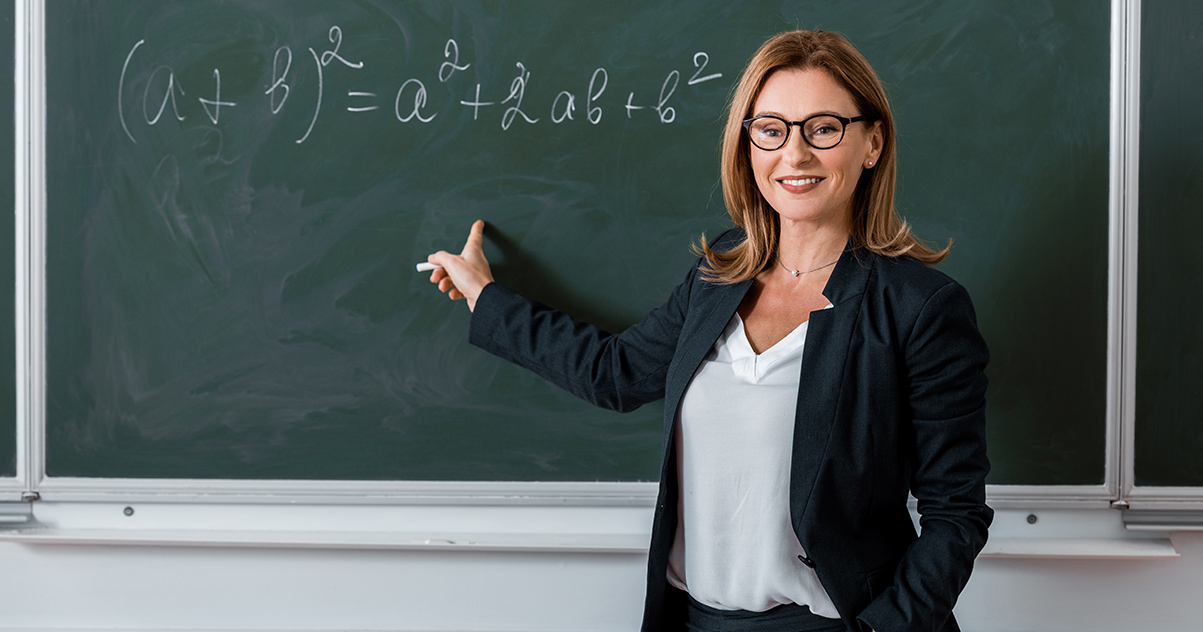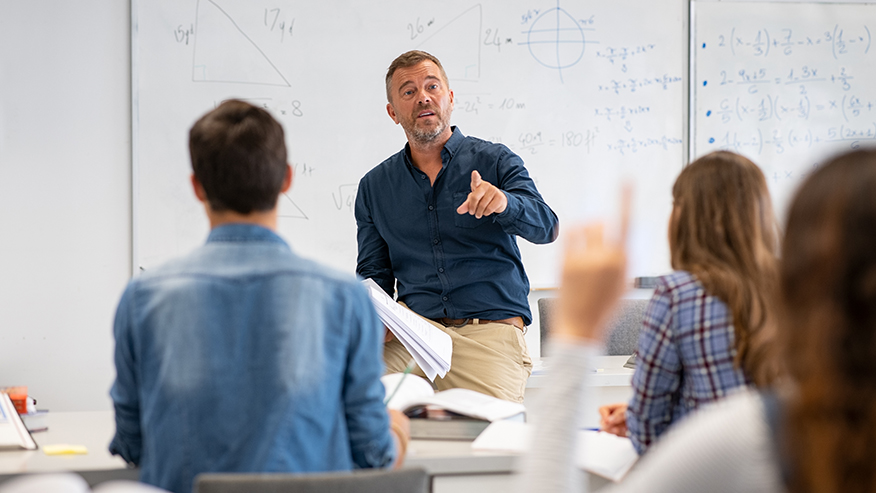Everything About Competent Math Educators: Their Role in Fostering Student Development and Accomplishment in Mathematics Education And Learning
Qualified mathematics instructors are essential fit trainees' understanding and appreciation of mathematics. Their deep knowledge and effective mentor techniques can significantly influence trainee end results. These educators not just present mathematical abilities however additionally promote an inclusive environment that satisfies varied learning needs. As they take on cutting-edge methods, the inquiry occurs: exactly how do these methods particularly enhance student engagement and success in mathematics?
The Relevance of Certified Mathematics Educators in Education And Learning
Several factors contribute to trainee success in maths, the visibility of certified math educators stands out as an essential element in cultivating reliable learning settings. Research regularly suggests that pupils taught by instructors with solid mathematical histories have a tendency to demonstrate greater degrees of understanding and accomplishment. Qualified mathematics instructors not only have a deep understanding of mathematical concepts but also the pedagogical skills necessary to share complex ideas in accessible means. They can recognize students' individual demands and adapt their mentor strategies as necessary, advertising inclusivity and engagement. Additionally, their know-how permits them to create a positive classroom environment that urges risk-taking and resilience in analytical. This encouraging atmosphere fosters a development frame of mind amongst students, enhancing their self-confidence and inspiration in maths. Generally, qualified mathematics teachers play a vital function in shaping pupils' mindsets towards mathematics, inevitably affecting their future chances and academic trajectories.
Secret High Qualities of Effective Mathematics Educators
Efficient mathematics teachers possess several key qualities that enhance their training efficiency. These consist of deep subject understanding, solid communication abilities, and flexible teaching approaches that satisfy diverse knowing requirements. Identifying and growing these features can substantially influence pupil understanding and involvement in mathematics.
Deep Subject Knowledge
While a solid instructional technique is necessary, deep subject understanding stays a cornerstone of effective mathematics instructors. Such expertise makes it possible for instructors to understand mathematical ideas completely and to anticipate trainee misconceptions. Educators with a solid grasp of math not only provide content with confidence yet also link various topics, cultivating a richer learning environment. They are equipped to use diverse mentor techniques that provide to various knowing styles, making intricate ideas much more easily accessible. Deep subject knowledge encourages teachers to engage in purposeful discussions with students, encouraging crucial thinking and analytical skills. Ultimately, the deepness of comprehending that mathematics educators have greatly influences trainees' academic growth and accomplishment in mathematics, laying a strong foundation for future learning.

Solid Communication Skills
Deep subject knowledge alone is insufficient for cultivating a productive learning atmosphere in mathematics; strong communication abilities are similarly important for efficient math teachers. These skills make it possible for educators to share intricate concepts in accessible methods, making sure that trainees grasp foundational ideas. Efficient interaction includes not just quality but also the capability to actively pay attention, urging student participation and resolving misconceptions. By fostering an open dialogue, teachers develop a supportive classroom ambience where pupils really feel comfortable asking questions and revealing their ideas. Furthermore, solid communicators can adjust their language and explanations to fit diverse discovering styles, enhancing trainee interaction and understanding. Ultimately, efficient communication bridges the space between an instructor's understanding and a trainee's understanding, greatly impacting scholastic achievement in maths.
Adaptive Teaching Strategies
A variety of adaptive teaching methods are crucial for efficient mathematics educators aiming to meet the diverse requirements of their trainees. These methods enable teachers to tailor their instruction based on specific discovering styles, capabilities, and interests. qualified math teachers. Techniques such as separated direction, where instructors modify content, product, or process, assistance address differing efficiency degrees. In addition, including modern technology and interactive tools can improve interaction and promote tailored knowing experiences. Formative assessments allow educators to monitor progress and readjust mentor methods appropriately. Collaborative team job advertises peer learning, cultivating a helpful atmosphere. By utilizing these flexible approaches, mathematics teachers can develop inclusive class that urge all students to flourish and achieve their scholastic objectives, eventually cultivating a love for maths
Ingenious Training Approaches Utilized by Math Educators
As instructors look for to engage students better, cutting-edge teaching methods have emerged as a prime focus in mathematics class. These techniques intend to enhance understanding and retention of mathematical concepts. One prominent approach is the use of modern technology, such as interactive software program and online simulations, which enables students to picture intricate issues and get immediate feedback.Additionally, project-based understanding motivates partnership and real-world application of mathematics concepts, fostering vital believing abilities. Gamification, where mathematics concepts are incorporated into game-like settings, has likewise acquired popularity, making discovering more pleasurable and encouraging for students.Moreover, separated direction tailors lessons to suit differing skill levels, guaranteeing that all trainees can progress at their very own speed. By employing these cutting-edge methods, mathematics instructors develop vibrant knowing experiences, eventually promoting greater trainee growth and achievement in mathematics.
Developing Inclusive Discovering Settings
Producing comprehensive learning settings in mathematics education and learning entails implementing varied understanding techniques and cultivating collaborative group tasks. These methods accommodate the diverse requirements Check Out Your URL of trainees, making sure that every person has the opportunity to involve and prosper. By focusing on inclusivity, math educators can grow a classroom ambience that sustains all learners.
Diverse Understanding Methods
While numerous instructors undertaking to cultivate inclusive understanding atmospheres, applying varied knowing methods is important for effectively reaching all trainees. These methods incorporate a series of training approaches tailored to suit differing discovering capacities, styles, and histories. Including visual help, manipulatives, and modern technology can engage pupils that may struggle with typical instruction. Additionally, separated instruction enables instructors to change analyses and tasks, guaranteeing that every student can access the curriculum at their very own level. Culturally responsive rearing additionally plays a considerable function in identifying and valuing the diverse experiences of students, thereby boosting their connection to the material. By making use of these diverse discovering methods, certified mathematics instructors can produce an encouraging environment where all students are empowered to be successful in mathematics.
Collaborative Group Activities

The Effect of Professional Mathematics Educators on Student Accomplishment
The existence of qualified mathematics educators significantly influences pupil achievement, as reliable direction can bridge voids in understanding and cultivate a favorable understanding setting. Research study shows that pupils educated by seasoned teachers show greater levels of proficiency in mathematical concepts contrasted to their peers. Certified math educators have a deep understanding of mathematical material, enabling them to existing product in diverse manner ins which cater to different discovering styles. This flexibility not just boosts understanding however also increases pupil confidence in their abilities.Moreover, certified teachers frequently employ developmental evaluations to keep track of pupil progression, enabling prompt interventions when necessary. Their capability to create engaging lessons motivates pupil involvement and promotes a growth mindset. Consequently, the influence of certified math instructors prolongs beyond plain academic efficiency; it grows a feeling of interest and resilience in students, inevitably leading to improved outcomes in maths and a more powerful foundation for future learning.
Approaches for Involving Students in Mathematics
Involving trainees in mathematics needs a click this link multifaceted method that integrates varied strategies to capture their passion and enhance understanding. One efficient approach is the usage of real-world applications, allowing students to see the significance of mathematical ideas in daily life. Integrating technology, such as interactive software and on the internet resources, can likewise cultivate involvement by providing dynamic knowing experiences.Group job urges collaboration, making it possible for students to gain from one another and establish analytic abilities in a supportive setting. Additionally, integrating games and hands-on activities can make discovering even more satisfying and accessible.Differentiated guideline satisfies various learning styles, making sure that all pupils can attach with the material. Offering you can try these out timely comments assists trainees identify their development and areas for improvement, cultivating a growth mindset. By employing these strategies, teachers can produce an engaging mathematics classroom that advertises trainee growth and achievement.
The Function of Specialist Growth in Enhancing Mathematics Training Skills
While lots of educators identify the value of reliable teaching approaches, specialist advancement plays a necessary duty in boosting mathematics teaching abilities (qualified math teachers). Continuous training opportunities allow educators to stay present with pedagogical advancements, mathematical content, and technical devices. Seminars and workshops supply discussion forums for educators to team up, share ideal techniques, and talk about challenges they run into in the classroom.Furthermore, specialist advancement cultivates a growth frame of mind amongst instructors, urging them to show on their techniques and adapt their approaches based on pupil demands. This recurring knowing process not only improves instructors' mathematical understanding but additionally outfits them with ingenious training techniques that can cause enhanced pupil engagement and achievement.Ultimately, a structured professional development program can substantially affect the top quality of mathematics education and learning, ensuring that teachers are well-prepared to inspire and lead their pupils toward success in mathematics
Often Asked Inquiries
What Qualifications Are Required to End Up Being a Mathematics Educator?
To end up being a mathematics teacher, individuals typically require a bachelor's level in maths or education and learning, training qualification, and a strong understanding of mathematical principles. Added credentials may include specialized training in rearing and class administration abilities.

Exactly How Do Math Educators Assess Student Progression in the Classroom?
Math instructors assess student progression via various approaches, including tests, jobs, and tests (qualified math teachers). They also utilize observational assessments and trainee involvement to determine understanding, changing direction based upon private and group efficiency to boost finding out results
What Difficulties Do Mathematics Teachers Typically Face?
Math teachers typically encounter difficulties such as varying pupil ability degrees, minimal sources, curriculum restraints, and the demand to involve pupils successfully. Furthermore, they usually run into pressure to improve standardized examination ratings and take care of class actions.
Just How Can Parents Support Their Kid's Mathematics Education?
Moms and dads can support their youngster's mathematics education by providing a favorable knowing setting, taking part in math-related tasks, encouraging a positive attitude towards difficulties, and maintaining open communication with educators to check progress and address issues.
What Resources Are Available for Mathematics Educators to Improve Their Skills?
Various resources are available for mathematics educators, including on the internet training courses, expert development workshops, peer cooperation teams, educational websites, and teaching journals. These devices enhance training techniques, grow subject understanding, and eventually enhance pupil learning outcomes in maths. Certified mathematics instructors are vital in forming trainees' understanding and admiration of maths. Numerous aspects contribute to pupil success in mathematics, the existence of qualified math teachers stands out as a critical element in fostering reliable learning settings. In addition, qualified math teachers facilitate these communications by tactically organizing trainees, guaranteeing that each team has a mix of ability levels and histories. The existence of certified math educators substantially influences trainee success, as effective instruction can bridge voids in understanding and foster a favorable discovering environment. Mathematics educators typically deal with challenges such as varying student ability levels, restricted resources, curriculum constraints, and the need to engage trainees effectively.
Comments on “The link between qualified math teachers and higher student math test scores”